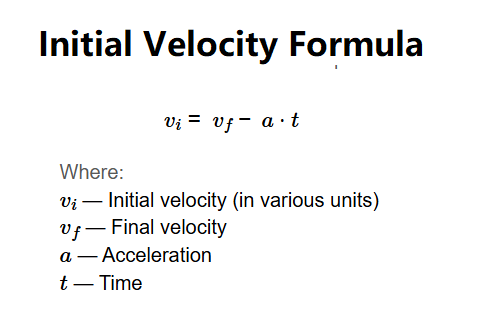 Home
Home
 Back
Back

Definition: This calculator computes the initial velocity (\( v_i \)) of an object undergoing constant acceleration, based on its final velocity (\( v_f \)), acceleration (\( a \)), and time (\( t \)).
Purpose: It is used in physics to analyze motion under constant acceleration, applicable in kinematics problems such as vehicle motion, free fall, or projectile motion.
The calculator uses the relationship:
Where:
Explanation: Enter the acceleration, time, and final velocity in the chosen units, and the calculator computes the initial velocity. Results are displayed with 5 decimal places, using scientific notation if the value exceeds 100,000 or is less than 0.0001. For default inputs (\( a = 2 \, \text{m/s}^2 \), \( t = 3 \, \text{s} \), \( v_f = 10 \, \text{m/s} \)), the calculated initial velocity \( v_i \) is 4.00000 m/s.
Details: Calculating the initial velocity is crucial for understanding the motion of objects under constant acceleration, aiding in the design of vehicles, analysis of sports dynamics, and solving physics problems.
How do I find the initial velocity?
Measure the final velocity in meters/second, the acceleration in meters/second², and the time in seconds. Compute the initial velocity using the formula \( v_i = v_f - a \cdot t \). The result will be in meters/second.
How can I find acceleration with initial velocity and other parameters?
Measure the initial velocity in meters/second, final velocity in meters/second, and time in seconds. Use the equation \( v_i = v_f - a \cdot t \) and solve for \( a \): \( a = \frac{v_f - v_i}{t} \), ensuring \( t \neq 0 \).
What is the formula for the initial velocity?
The formula for the initial velocity is \( v_i = v_f - a \cdot t \), where \( v_i \) is the initial velocity, \( v_f \) is the final velocity, \( a \) is the acceleration, and \( t \) is the time. The standard unit for velocity is meters/second (m/s).